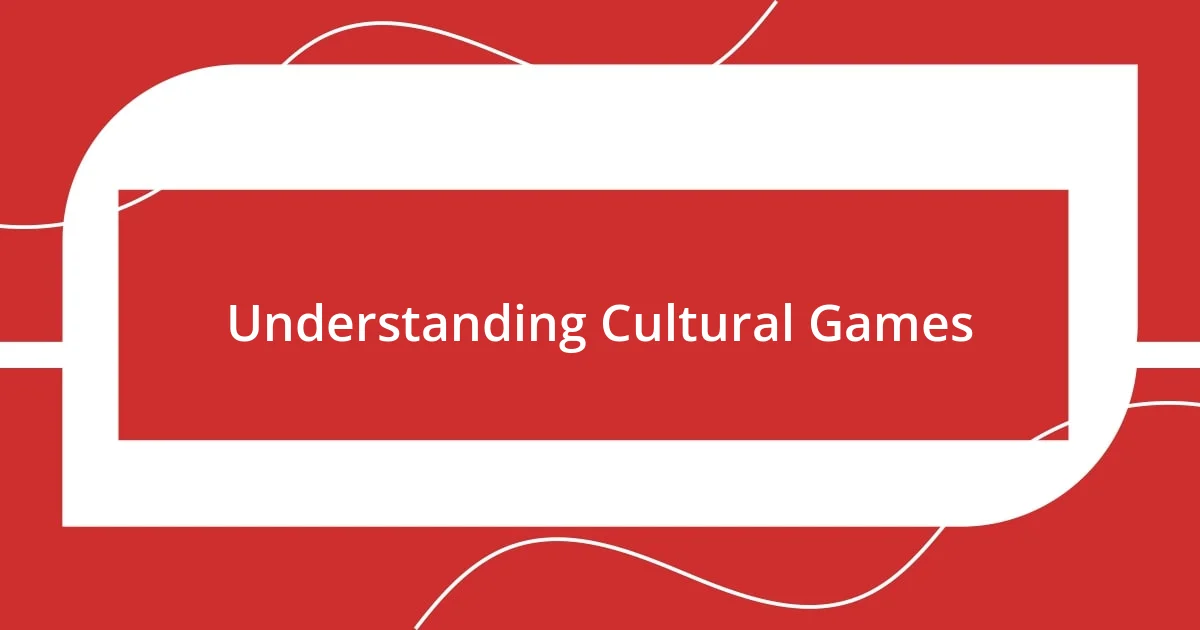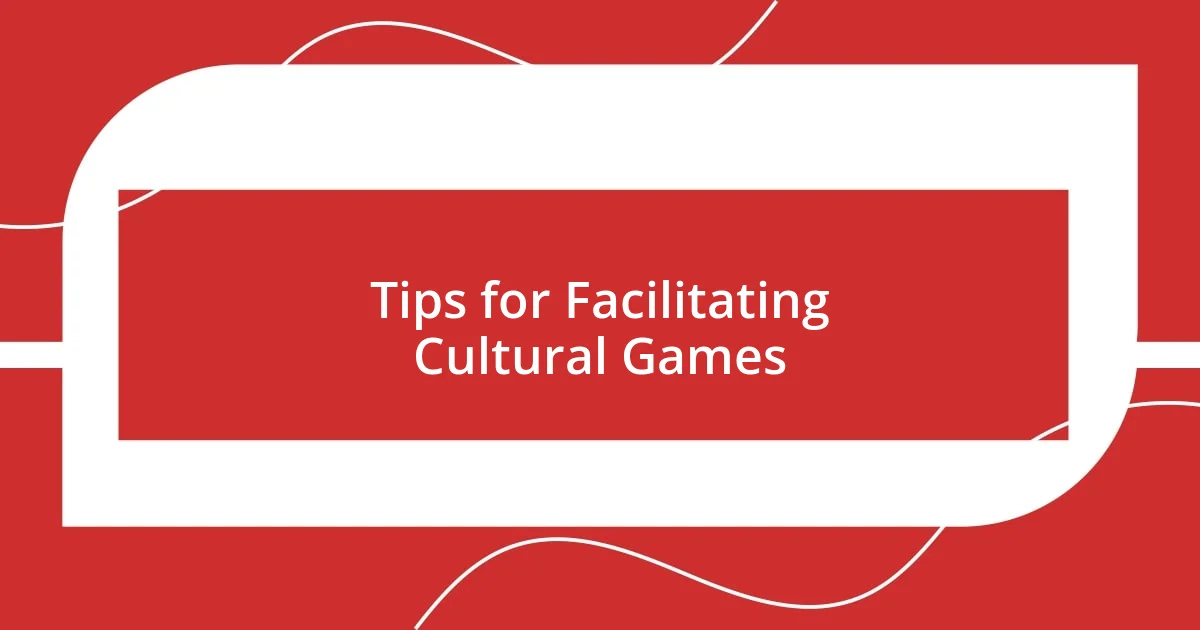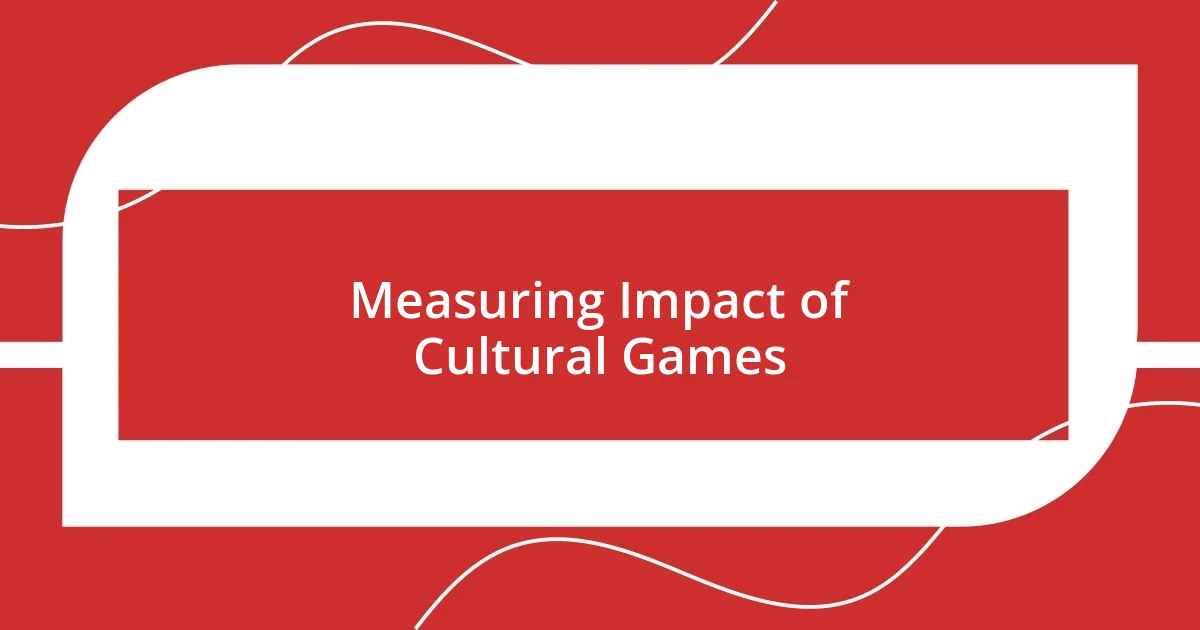Key takeaways:
- Cultural games provide insights into values, beliefs, and social interactions, fostering connections across generations and promoting understanding among diverse communities.
- Incorporating cultural games into education enhances learning by promoting teamwork, empathy, and cultural appreciation while making lessons engaging and memorable.
- Successful implementation of cultural games in classrooms facilitates rich discussions, develops interpersonal skills, and cultivates respect for different cultures through shared experiences.

Understanding Cultural Games
Cultural games are fascinating windows into the values, beliefs, and social interactions of different communities. I remember playing a traditional game from my childhood, where we’d gather in a circle and share stories while passing an object around. This experience not only taught us the importance of listening but also deepened our understanding of each other’s backgrounds and cultures in a playful way.
When I think of cultural games, I’m often struck by how they act as a bridge across generations. There’s something incredibly poignant about watching my grandparents teach me their childhood games, allowing me to grasp their experiences and emotions. Have you ever participated in a game handed down through your family? It’s a beautiful way to connect our past with the present.
Moreover, these games serve a significant purpose in education, providing insights into conflict resolution, cooperation, and strategy. For instance, I once played a game that simulated traditional trading practices in my community. It was a powerful lesson in negotiation and teamwork, illustrating not just cultural traditions, but also essential life skills that extend far beyond the game itself.

Popular Cultural Games Overview
The diversity of cultural games is genuinely remarkable. Each game, deeply rooted in its community, offers unique insights into collective values. I vividly remember a lively evening spent playing a strategic board game from a friend’s culture, where moves were accompanied by rich storytelling. It opened my eyes to the importance of narrative in their traditions, reinforcing the idea that every move on the board was a metaphor for real-life decisions and consequences.
When examining popular cultural games, it’s fascinating to see how some have transcended borders. For example, I enjoyed a version of the Indian game “Pachisi,” which inspired the modern board game “Ludo.” This interconnectivity reminded me that no matter where we come from, the core themes of competition, strategy, and community are universal. Have you ever thought about how a game you love might share its roots with another culture’s favorite?
In education, these cultural games not only teach us skills but also foster empathy and understanding. I participated in a role-playing game that mimicked community leadership styles across different cultures. It was an enlightening experience that reshaped my view of leadership and cooperation. The laughter and camaraderie I experienced that day highlighted how cultural games go beyond fun—they are essential tools for building bridges of understanding.
| Game | Region |
|---|---|
| Pachisi | India |
| Ludo | Global |
| Mahjong | China |
| Senet | Ancient Egypt |

Incorporating Cultural Games in Classrooms
Incorporating cultural games into the classroom offers a dynamic way to enrich students’ learning experiences. When I first introduced a traditional Hawaiian game called “Ulu Maika” in my lesson plan, I saw how it sparked joy and curiosity among my students. Not only did they learn the rules of the game, but they also absorbed the history behind it, gaining appreciation for Hawaiian culture. Watching the excitement on their faces as they rolled stones down a lane reminded me how engaging hands-on activities can make learning unforgettable.
Here are some practical tips to effectively incorporate cultural games in your classes:
- Choose Games with Meaning: Select games that align with the cultural studies you’re teaching, ensuring relevance and depth.
- Facilitate Discussions: After playing a game, hold a reflective conversation about the cultural significance and the lessons learned.
- Encourage Group Play: Promote teamwork by assigning students to groups, allowing them to build interpersonal skills through collaboration.
- Integrate History and Geography: Use games as a starting point to explore the cultural contexts, exploring where they originated and their importance over time.
- Create Student-led Sessions: Allow students to teach each other, fostering leadership and presentation skills while enhancing their understanding.
By thoughtfully weaving cultural games into lessons, educators can create a vibrant, inclusive atmosphere that celebrates diversity while promoting an engaging learning environment.

Tips for Facilitating Cultural Games
When facilitating cultural games, it’s essential to create an inviting and safe environment for all participants. I recall hosting a game day with relatives from different backgrounds; some were initially hesitant to join. To break the ice, I shared a humorous story about my own mistakes while learning a traditional game, which transformed the mood. This approach not only eased the tension but also encouraged everyone to share their experiences, making it a collective learning journey.
Another tip to consider is to adapt the rules or format of the game to fit your group’s dynamics. A few years back, I hosted a community event featuring a lively dance game from West Africa. To accommodate varying skill levels, we modified some of the movements and added a fun twist where everyone could contribute their own dance style. Have you ever noticed how small adjustments can transform a game into a truly inclusive experience? It’s incredible how such changes can elevate participation and make everyone feel valued.
Lastly, reflecting on the cultural aspect of the games is crucial. After a lively round of “Mancala,” I facilitated a discussion about its historical roots in Africa. The students were fascinated to learn how each move symbolized resource management and strategic thinking vital for survival. This not only solidified their understanding of the game but also sparked conversations about the importance of preserving cultural traditions. How rewarding it is to witness firsthand the connections that cultural games can build, right? When I see those lightbulb moments in others, it reaffirms my love for these educational experiences.

Measuring Impact of Cultural Games
Measuring the impact of cultural games in education can truly be a transformative endeavor. I remember conducting a survey after integrating a traditional Japanese game called “Kendama” into a physics unit. The joy on students’ faces was matched only by their eagerness to express how the game helped them grasp concepts like balance and trajectory. It was remarkable to see how this playful activity shifted their perspective on learning; the data we gathered revealed not just improved test scores but also heightened engagement.
As I dug deeper into the results, I was fascinated by the qualitative feedback from students. Many shared how the sense of community formed during these games fostered friendships beyond the classroom. It made me ponder: isn’t education not just about academic success but also about cultivating connections? This human element can be hard to quantify, yet it’s undeniably impactful. By drawing correlations between students’ collaboration during the games and their social development, I found compelling evidence of cultural games not only enriching academic performance but enhancing interpersonal skills as well.
Finally, I believe that tracking the cultural appreciation stemming from these games is vital. After playing a traditional Inuit game called “Kukwaj,” students expressed newfound respect and curiosity about Indigenous cultures. Their reflections demonstrated a broader understanding of cultural significance, illustrating how a simple game can ignite a desire to learn more. It’s moments like these that highlight the profound influence cultural games can have—not just on knowledge acquisition but on empathy and open-mindedness among students. How gratifying it is to see that what starts as a game can lead to deeper conversations about culture, values, and understanding!

Case Studies of Successful Implementation
It’s fascinating to examine cases where cultural games have been successfully implemented in educational settings. For instance, I once facilitated a series of workshops using the traditional Mexican game “Lotería” to teach vocabulary and cultural concepts in Spanish class. The laughter and friendly competition palpable in the room not only engaged the students but also led to an appreciation for the cultural nuances behind each card. I still smile when I recall how they eagerly shared their interpretations, turning a simple game into a vibrant cultural exchange.
In another instance, I integrated the Indian game “Kabaddi” into a physical education curriculum to promote teamwork and strategy. The initial skepticism among my students quickly turned to enthusiasm as they navigated the game’s complexities. I remember their faces lighting up after a tough match, where they learned not just about physical endurance but also the significance of collaboration—this connection was a true eye-opener for many. Isn’t it incredible how a game can transcend mere physical activity and become a lesson in unity?
Finally, I’ll never forget the remarkable transformation I witnessed while introducing the Middle Eastern game “Haç” in a diverse classroom. At first, students from different backgrounds hesitated, unsure of how to engage. However, by the end, they were passionately advocating for their interpretations of the game’s strategies. It was like watching a bridge build between cultures—how could something so simple spark such rich discussions? Moments like these affirm my belief that cultural games aren’t just games; they’re powerful tools for education and dialogue.













